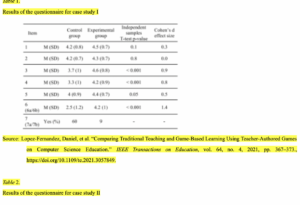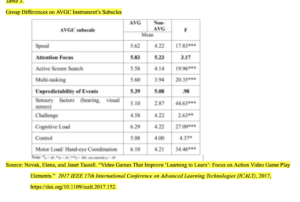Playing video games is a popular activity nowadays. People play these games when they have free time in any place. For example, people play video games when they take the subway or play these competitions in their dorms after they finish their assignments. Many people play these games together and become friends because of playing electronic games. With the development of video games, playing video games has become an occupation. In this case, people can earn money from playing these games. There is evidence to show that playing video games have benefited people therapeutically (Griffiths and Mark 484). Also, playing video games have other learning benefits. This essay aims to show that playing video games can help people learn and refute the perspective that people cannot learn anything from playing video games. There are two aspects to show that playing video games helps people learn: playing video games can improve the ability of resilience in the face of failure and improve their motivation for learning. However, there are some risks for playing video games, such as becoming too obsessed with these games (Barbero et al. 157). People may argue that playing prosocial video games will increase people’s aggressive tendencies, but there is evidence to show that playing prosocial video games activates the cognitive route of the GLM, which is the
area related to prosocial thoughts. In addition, some people believe that there is no relationship between playing video games and cognitive abilities, but there is evidence to show that playing video games can help people’s cognitive skills.
First of all, people can enhance the ability of resilience in the face of failure while playing video games. From playing video games, people can learn that they will reap valued rewards after they persist in the face of failure (Granic et al. 71). An ancient Chinese proverb says, “Failure is the mother of success.” People need to experience failures to succeed in the future. In video games, people have opportunities for winning and losing. Game players will enjoy the feeling of victories, but they also need to face and accept failures. Evidence shows that video games are good training for resilience in the face of failure because they use failures as motivation tools and provide intermittent chances for enormous success (Granic et al. 71). Granic and other researchers say, “If intelligence or ability is presumed to be a mark of effortful engagement, failure signals the need to remain engaged and bolster one’s efforts. In turn, this positive attitude toward failure predicts better academic performance” (71). By playing video games, people can summarize experiences from failures and gain motivation from losses when they fail a game. In this case, people can have the ability of resilience in the face of failure from playing video games. When people get low grades in courses or other failures, they can face and accept their failures easily and earn motivation to get higher grades in their classes. As a result, they can have better academic performance and know that persistence in the face of failure reaps valued rewards from learning. Therefore, playing video games
can help people to learn the ability of resilience in the face of failures. People can gain motivation from attaining rewards after persistence in the face of failure, but there is a more direct motivation from playing video games. If teachers use video games in their classes, students have more motivation and engagement in classes (Lopez-Fernandez et al.372). In this case, video games positively influence students’ academic performance. There is evidence to prove this perspective. Lopez-Fernandez and other researchers experimented by comparing learning in traditional class and in class which play educational video games (369). There were two case studies in this experiment. The only difference between these two case studies is that participants’ backgrounds were different. At first, all students took pre-test to test their actual knowledge. Then, they randomly assigned students to two groups: control and experimental groups. In the control group, students attended traditional classes. Students attended a class that learned exclusively by educational video games in the experimental group. After learning, students needed to take the post-test and write questionnaires for their opinions after the post-test. The score for pre-test and post-test was 0 to 10. The questionnaires contained six questions which scale from 1 (total disagree) to 5 (total agree), a yes or no question, and an opening question. The results of this experiment showed that the grades of pre-test and post-test had no difference, which could not illustrate that playing video games has an effort on the study. Although the pre-test and post-test between these two groups reveal the same learning effectiveness, the questionnaire results show that students are more engaging and motivating by attending a
class taught by educational video games. Table 2 and Table 3 reveal the results of each question in questionnaire for two groups. This experiment proves that using video games for teaching in class is more effective than traditional teaching in terms of student motivation. Although learning outcome is similar, students’ attitudes toward classes are significant. If students are motivated to learn, they will want to learn more and have a positive attitude to attend every class. As a result, playing video games can help students
learn because they are motivated to study.


Although video games have many positive impacts on learning, some critics believe that video games have a lousy influence because people will become more aggressive. At some point, playing video games can harm people, but people can benefit from games. Evidence shows that playing prosocial video games can improve people’s prosocial thoughts (Greitemeyer and Osswald 121). Greitemeyer and Osswald used an experiment to test the effectiveness of prosocial video games. At first, they randomly assigned 47 participants to two groups: one group played the prosocial game “Lemmings,” shown in Figure 1, and another group played the neutral game “Tetris.” After each group played the game, participants needed to attend to a lexical decision task. In this task, researchers wanted to find how fast people could discriminate between words and non-words. There were 32 trials in this task: 16 words and 16 non-words. The 16 cases of words contained eight prosocial words, such as kind, and eight neutral words, such as jump. In Figure 2,
this experiment showed that people who played the prosocial game had a faster reaction time for prosocial words than for neutral words and non-words. On the other hand, people who played neutral responded faster to neutral words than prosocial words and non words. Comparing the reaction time of prosocial words between people who played the prosocial game and the neutral game revealed that people who played the prosocial game had a faster reaction time for prosocial words than those who played the neutral game. This experiment shows that people can learn the feeling of empathy and will be more concerned for others by playing video games. Therefore, playing video games can
improve people’s prosocial thoughts rather than aggressive tendencies.


There is fact to refute the idea that people will become more aggressive through playing video games. Also, there is another argument about the relationship between playing video games and cognitive abilities. There is an outcome of an experiment showed that the cognitive abilities and video game trainings are only weakly correlated (Sala et al. 111). However, playing video games can improve people’s cognitive skills. Cognitive ability has many functions, such as reasoning ability, problem-solving, memory performance, and attentional ability. Evidence shows that people can enhance their cognitive abilities by playing video games. At first, people can improve their reasoning ability by playing the video game (Chuang et al. 38). The experiment was divided into three groups: puzzle adventure game, paper-based training, and no training. Participants would take pre-test and post-test to test their reasoning ability in each group. In comparing the puzzle adventure game group and no training group, this experiment showed that the puzzle adventure game groups had a higher grade than those in the no
training group in the post-test. However, the result did not show a significant difference in post-test scores between the paper-based and no training groups. This experiment proves that playing video games can help people enhance their reasoning ability. In addition, playing video games can enhance people’s hippocampal-based learning and memory performance (Schenk et al. 213). In the experiment, there were two groups: the gamer group and the non-gamer group. Gamer groups were defined by playing video games more than 15 hours per week, and the non-gamer group was characterized by playing video games less than 4 hours per week. Then, participants would take the weather prediction task (WPT), which tests the memory process. In this task, participants needed to classify one to three different cue cards into one of two weather categories (rain or sun) based on feedback they received for their actions. The result showed that video gamers have higher activation in the left hippocampus. In this case, playing a video game can activate people’s hippocampus, which will improve people’s memory performance. Also, playing video games can stimulate people’s attentional ability (Novak and Tassell 142). From the experiment, participants were divided into two groups: one group played an action video game (AVG), “Unreal Tournament,” and another group played a non action video game (non-AVG), “Angry bird.” Participants would play these games for 40 minutes and then rate their experiences with playing AVG by using a questionnaire. The result of the questionnaire in Table 3 showed no significant differences in attention focus and unpredictability of events between AVG and Non-AVG. In this case, it reflected that both types of games have the same effect on stimulating people’s attention. Therefore,
playing video games can improve people’s cognitive abilities, such as reasoning ability,
memory performance, and attention.

Works Cited
Barbero, Erika M., et al. “Healthcare Encounters for Pokémon Go: Risks and Benefits of Playing.” Games for Health Journal, vol. 7, no. 3, 2018, pp. 157–163., https://doi.org/10.1089/g4h.2017.0180.
Chuang, Tsung-Yen, et al. “The Impact of Game Playing on Students’ Reasoning Ability, Varying According to Their Cognitive Style.” Educational Technology & Society, vol. 24, no. 3, 2021, pp. 29–43,
https://www.jstor.org/stable/27032854. Accessed 10 Apr. 2022.
Dave Ozzy, et al. “Looking Back to 1991 and the Inimitable Lemmings.” TheXboxHub, 14 Feb. 2021, https://www.thexboxhub.com/looking-back-to-1991-and-the inimitable-lemmings/.
Granic, Isabela et al. “The benefits of playing video games.” The American psychologist vol. 69,1 (2014): 66-78. doi:10.1037/a0034857
Greitemeyer, Tobias, and Silvia Osswald. “Playing Prosocial Video Games Increases the Accessibility of Prosocial Thoughts.” The Journal of Social Psychology, vol. 151, no. 2, 2011, pp. 121–128., https://doi.org/10.1080/00224540903365588.
Griffiths, Mark D. “The Therapeutic and Health Benefits of Playing Video Games.” The Oxford Handbook of Cyberpsychology, 2019, pp. 484–505., https://doi.org/10.1093/oxfordhb/9780198812746.013.27.
Lopez-Fernandez, Daniel, et al. “Comparing Traditional Teaching and Game-Based
Learning Using Teacher-Authored Games on Computer Science Education.” IEEE Transactions on Education, vol. 64, no. 4, 2021, pp. 367–373., https://doi.org/10.1109/te.2021.3057849.
Novak, Elena, and Janet Tassell. “Video Games That Improve ‘Learning to Learn’: Focus on Action Video Game Play Elements.” 2017 IEEE 17th International Conference on Advanced Learning Technologies (ICALT), 2017, https://doi.org/10.1109/icalt.2017.152.
Sala, Giovanni, et al. “Video Game Training Does Not Enhance Cognitive Ability: A Comprehensive Meta-Analytic Investigation.” Psychological Bulletin, vol. 144, no. 2, 2018, pp. 111–139., https://doi.org/10.1037/bul0000139.
Schenk, Sabrina, et al. “Games People Play: How Video Games Improve Probabilistic Learning.” Behavioural Brain Research, vol. 335, 2017, pp. 208–214., https://doi.org/10.1016/j.bbr.2017.08.027.
